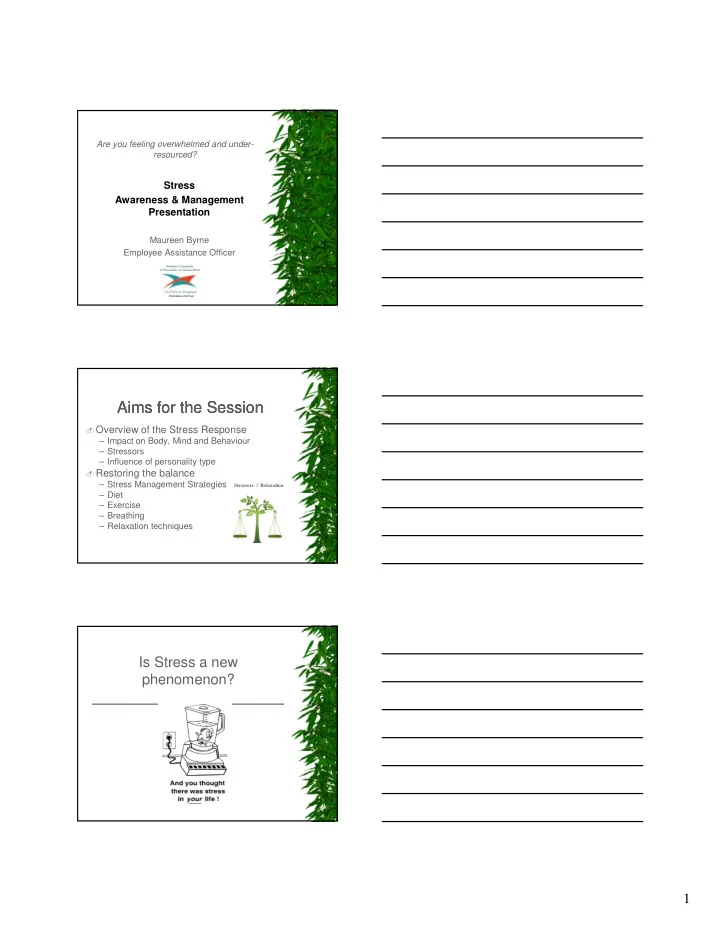

Are you feeling overwhelmed and under- resourced? Stress Awareness & Management Presentation Maureen Byrne Employee Assistance Officer Aims for the Session Aims for the Session � Overview of the Stress Response – Impact on Body, Mind and Behaviour – Stressors – Influence of personality type � Restoring the balance – Stress Management Strategies Stressors / Relaxation – Diet – Exercise – Breathing – Relaxation techniques Is Stress a new phenomenon? ������������������������ �� 1
����������������������� ����������������������� ����������������������� ����������������������� � � ��������������������������� � � ��������������������������� ��������������������������� ��������������������������� ���������������� ���������������� ���������������� ���������������� ����������������������������������� ����������������������������������� ����������������������������������� ����������������������������������� ���������������������� ��!�����������������!� ���������������������� ��!�����������������!� ���������������������� ��!�����������������!� ���������������������� ��!�����������������!� "����������������������������!��������������������� "����������������������������!��������������������� "����������������������������!��������������������� "����������������������������!��������������������� ������������� ������������� ������������� ������������� #���������������������������������$������� #���������������������������������$������� #���������������������������������$������� #���������������������������������$������� ����!��������������������������� ����!��������������������������� ����!��������������������������� ����!��������������������������� %����������!��������!�������������������������� %����������!��������!�������������������������� %����������!��������!�������������������������� %����������!��������!�������������������������� ��������������!�& ��������������!�& ��������������!�& ��������������!�& A. Cornelius Celsus (Born 25 BC) What is Stress • Stress is the normal mental and physical response resulting from exposure to any demand or pressure in our lives. • The greater the demand, the more intense the stress reaction. • Prolonged or excessive stress can cause distress. Extract from Stress and Stress Management (CISM Network Ireland) leaflet Common signs of excessive stress Can include: • Feeling overwhelmed • Anger • Loss of motivation, self-neglect • Anxiety, Depression • Dreading going to work • Racing heart, breathlessness and rapid breathing • Becoming withdrawn • Feeling hot and flushed, excessive sweating • Racing thoughts • Dry mouth, churning stomach • Confusion • Diarrhoea and Digestive problems • Difficulty making decisions • Frequent desire to use toilet • Poor concentration • Muscle tension • Poor memory • Restlessness, tiredness, sleep difficulties, headaches • Overeating, lost of appetite 2
Did you know? � 75% of health problems presenting to doctors in the U.S. are stress-related illnesses …. Statistics from U.S. Centres for Disease Control and Prevention � Stress destroys the body’s ability to repair itself and to fight disease ��������������� 3
Stressors � Stimuli which have the potential for causing you to respond with stress. � Stressors remain neutral- your unique response to them and the stress they trigger in you, is dependent on your perception of the event. � An event which is fun and exciting for one, can be dreaded and stressful for another. Personality Type and Stress � Personality type is a major contributor to a person’s stress load � It is rare that a person is exclusively one type - more likely to be a mixture of types, with a tendency towards one or the other � Personality types are modifiable- the starting point is knowing what type you were to begin with: - Type A: Self- induced stress - Type B: Avoids excess stress 4
Optimum Level Stress Benefits � Sharper focus � Greater strength � More speed � Sharper hearing � Greater determination � Competitive � Faster decision making � Better short-term judgement ������������������������� ����������� ������������������������� ����������� "10% of our life depends on what happens to us"... "90% of our life depends on how we react to it....“ 10:90 Principle………Stephen Covey 5
“ Men are disturbed not by things but by the views which they take of them” Epictetus First century A.D . Where do we get our negative beliefs from ? � Many of our beliefs are formed in our developmental years � From care givers, relatives and friends � From our own incorrect interpretations � From experiences Cognition /Thinking B = Beliefs and self talk C = emotional A = Situation reaction 6
A.B.C check What am I thinking? B C A What is the situation that is What are my feelings? causing the feelings? Balance the Thinking � What am I telling � What happened? myself? (self-talk) � What am I feeling? � What am I assuming ‘should be’? � What am I thinking? � Is there a real concern? � How am I behaving? � Am I over-reacting? What you think you see? 7
Can You restore the balance? � Stress management Vs. banishment � Breathing � Diet � Relaxation techniques � Mindfulness Stressors/Relaxation � Exercise & Self care � Rest and Sleep � Humour Self-care Tips Exercise Mindfulness Relaxation Diet Techniques Breathing Stress Management Strategies � Try to do something about the cause of stress and if you cannot remove the cause then cushion yourself from the effects � Ways of coping with stress can either be helpful or unhelpful: - Helpful to confront the problem and look for a solution - Unhelpful to avoid the problem as this often leads to alcohol and/or substance abuse and sickness absence 8
Recommend
More recommend